简单句、并列句和复合句(包括五大句型)知识交流
简单句、并列句和复合句(1)解析
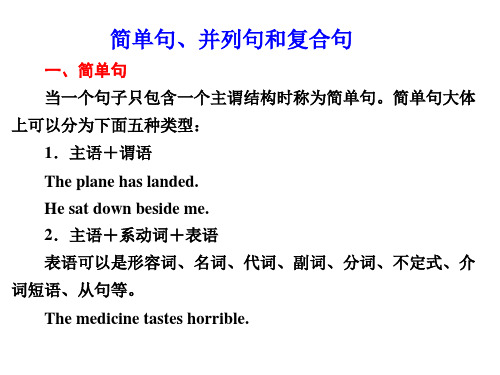
二、复合句
1.主语从句:在句子中充当句子主语的从句叫主 语从句。如:
When we should start is still a question. 2.表语从句:在句子中作连系动词的表语的句子, 它位于主句中的系动词之后。如:
三、复合句 包含一个主句和一个或几个从句的句子叫复合句,从句由从 属连词或关系代词引导。从句分为定语从句、名词性从句和状语 从句。
The news that our women volleyball team had won the championship encouraged us all greatly.
简单句、并列句和复合句
一、简单句 当一个句子只包含一个主谓结构时称为简单句。简单句大体 上可以分为下面五种类型: 1.主语+谓语 The plane has landed. He sat down beside me. 2.主语+系动词+表语 表语可以是形容词、名词、代词、副词、分词、不定式、介 词短语、从句等。
⑤结果状语从句通常由so that...,so...that... 等引导,放在句尾。
⑥比较状语从句通常由as,than, as(so)...as等引导。
⑦让步状语从句通常由though(although), as,even if(even though),however, whatever等引导。
⑧条件状语从句通常由if,unless,as long as等引导。
感悟高考
1.I refuse to accept the blame for something B was
高考英语 第十章 简单句 并列句 复合句知识精讲
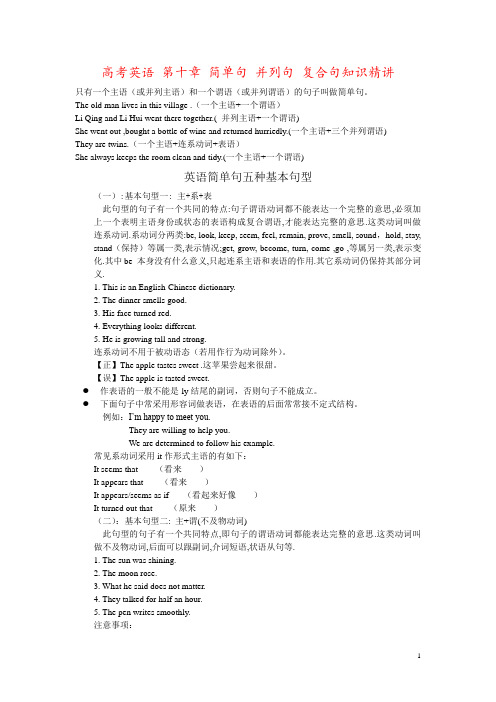
高考英语第十章简单句并列句复合句知识精讲只有一个主语(或并列主语)和一个谓语(或并列谓语)的句子叫做简单句。
The old man lives in this village .(一个主语+一个谓语)Li Qing and Li Hui went there together.( 并列主语+一个谓语)She went out ,bought a bottle of wine and returned hurriedly.(一个主语+三个并列谓语)They are twins.(一个主语+连系动词+表语)She always keeps the room clean and tidy.(一个主语+一个谓语)英语简单句五种基本句型(一):基本句型一: 主+系+表此句型的句子有一个共同的特点:句子谓语动词都不能表达一个完整的意思,必须加上一个表明主语身份或状态的表语构成复合谓语,才能表达完整的意思.这类动词叫做连系动词.系动词分两类:be, look, keep, seem, feel, remain, prove, smell, sound,hold, stay, stand(保持)等属一类,表示情况;get, grow, become, turn, come ,go ,等属另一类,表示变化.其中be 本身没有什么意义,只起连系主语和表语的作用.其它系动词仍保持其部分词义.1. This is an English-Chinese dictionary.2. The dinner smells good.3. His face turned red.4. Everything looks different.5. He is growing tall and strong.连系动词不用于被动语态(若用作行为动词除外)。
【正】The apple tastes sweet .这苹果尝起来很甜。
【误】The apple is tasted sweet.●作表语的一般不能是-ly结尾的副词,否则句子不能成立。
句子句型有哪几种结构
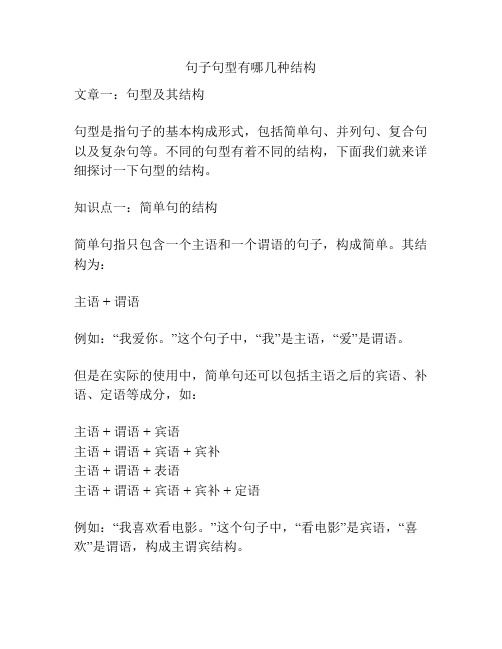
句子句型有哪几种结构文章一:句型及其结构句型是指句子的基本构成形式,包括简单句、并列句、复合句以及复杂句等。
不同的句型有着不同的结构,下面我们就来详细探讨一下句型的结构。
知识点一:简单句的结构简单句指只包含一个主语和一个谓语的句子,构成简单。
其结构为:主语 + 谓语例如:“我爱你。
”这个句子中,“我”是主语,“爱”是谓语。
但是在实际的使用中,简单句还可以包括主语之后的宾语、补语、定语等成分,如:主语 + 谓语 + 宾语主语 + 谓语 + 宾语 + 宾补主语 + 谓语 + 表语主语 + 谓语 + 宾语 + 宾补 + 定语例如:“我喜欢看电影。
”这个句子中,“看电影”是宾语,“喜欢”是谓语,构成主谓宾结构。
知识点二:并列句的结构并列句指两个或多个同等重要的句子并列在一起,之间用逗号或者连接词等连接,结构为:主句 , 连接词 + 从句例如:“我喜欢看电影,但是我也喜欢看书。
”这个句子中,“我喜欢看电影”和“我也喜欢看书”分别构成主句,之间用连接词“但是”连接。
并列句也可以是同位语的并列结构,如:主句 + 连接词 + 同位词例如:“他是一位诗人,而我的朋友,也是一位诗人。
”这个句子中,“我的朋友”和“他”在本质上是同等的词语,分别用连接词“而”连接。
知识点三:复合句的结构复合句指由一个主句和一个或一个以上从句构成的句子,从句在主句中充当不同的语法成分,如定语、宾语、表语等,其结构为:主句 + 从句从句通常由连词引导,在复合句的结构中起到承上启下的作用。
从句可以是名词从句、定语从句、状语从句等等,如:主语 + 谓语 + 后置定语例如:“我的房间里,有一张书桌,上面放着我喜欢的小说。
”这个句子中,“上面放着我喜欢的小说”作为后置定语,修饰“一张书桌”。
综上所述,句型是指句子的基本构成形式,包括简单句、并列句、复合句等。
不同的句型有着不同的结构,而了解这些不同的结构可以帮助我们更好地理解句子的意思,从而更准确地表达自己的意思。
高考英语复习句子分类之简单句,并列句和复合句知识点
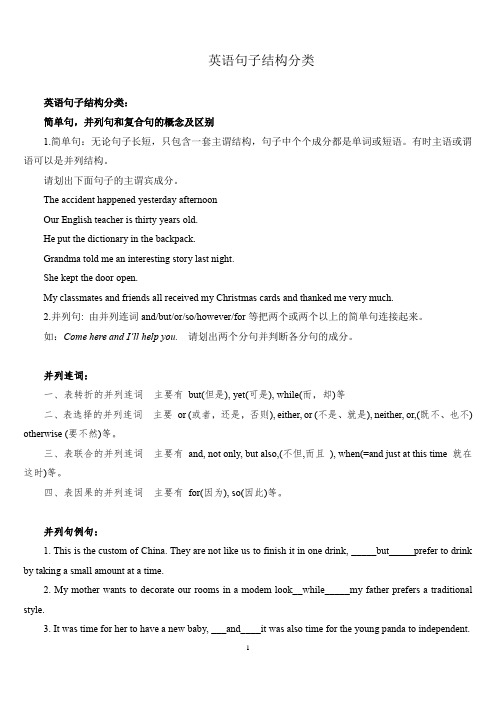
英语句子结构分类英语句子结构分类:简单句,并列句和复合句的概念及区别1.简单句:无论句子长短,只包含一套主谓结构,句子中个个成分都是单词或短语。
有时主语或谓语可以是并列结构。
请划出下面句子的主谓宾成分。
The accident happened yesterday afternoonOur English teacher is thirty years old.He put the dictionary in the backpack.Grandma told me an interesting story last night.She kept the door open.My classmates and friends all received my Christmas cards and thanked me very much.2.并列句: 由并列连词and/but/or/so/however/for等把两个或两个以上的简单句连接起来。
如:Come here and I’ll help you. 请划出两个分句并判断各分句的成分。
并列连词:一、表转折的并列连词主要有but(但是), yet(可是), while(而,却)等二、表选择的并列连词主要or (或者,还是,否则), either, or (不是、就是), neither, or,(既不、也不) otherwise (要不然)等。
三、表联合的并列连词主要有and, not only, but also,(不但,而且), when(=and just at this time 就在这时)等。
四、表因果的并列连词主要有for(因为), so(因此)等。
并列句例句:1. This is the custom of China. They are not like us to finish it in one drink, _____but_____prefer to drink by taking a small amount at a time.2. My mother wants to decorate our rooms in a modem look__while_____my father prefers a traditional style.3. It was time for her to have a new baby, ___and____it was also time for the young panda to independent.4. He is a shy man,__but/yet_______he is not afraid of anything or anyone. 解析:But/yet转折连词。
简单句、并列句和复合句的区别
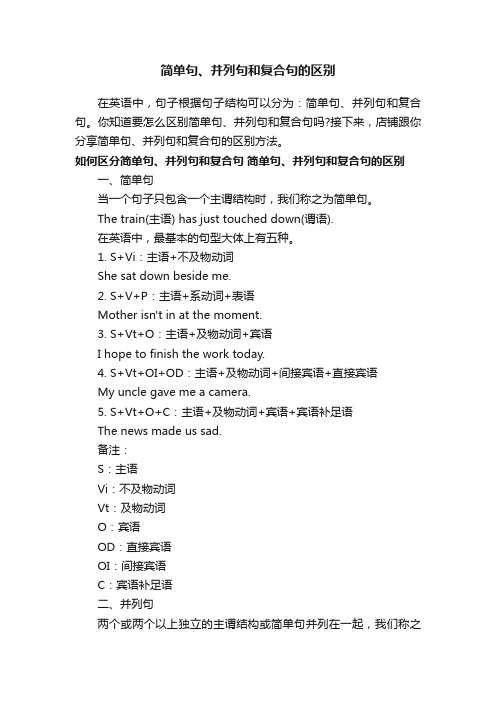
简单句、并列句和复合句的区别在英语中,句子根据句子结构可以分为:简单句、并列句和复合句。
你知道要怎么区别简单句、并列句和复合句吗?接下来,店铺跟你分享简单句、并列句和复合句的区别方法。
如何区分简单句、并列句和复合句简单句、并列句和复合句的区别一、简单句当一个句子只包含一个主谓结构时,我们称之为简单句。
The train(主语) has just touched down(谓语).在英语中,最基本的句型大体上有五种。
1. S+Vi:主语+不及物动词She sat down beside me.2. S+V+P:主语+系动词+表语Mother isn't in at the moment.3. S+Vt+O:主语+及物动词+宾语I hope to finish the work today.4. S+Vt+OI+OD:主语+及物动词+间接宾语+直接宾语My uncle gave me a camera.5. S+Vt+O+C:主语+及物动词+宾语+宾语补足语The news made us sad.备注:S:主语Vi:不及物动词Vt:及物动词O:宾语OD:直接宾语OI:间接宾语C:宾语补足语二、并列句两个或两个以上独立的主谓结构或简单句并列在一起,我们称之为并列句。
各个简单句间是平行并列的关系,而非从属关系。
并列句的各个分句间可用逗号、分号、起连接作用的副词或并列连接词来连接。
1. 能连接并列句的连词and(和,又),but(但是),for(因为),however(然而),or(或者),so(所以,因而),while(然而),yet(然而)2. 能连接并列句的复合连词or else(否则,要不然),either...or...(要么···,要么···;或者···,或者···),neither...nor...(既不···,也不···),not only...but also(不仅···,而且···)3. 能连接并列句的副词besides(而且,还有),hence(因此),otherwise(否则,要不然),then(然后,于是),therefore(因此,所以),thus(因而,从而) 根据并列分句之间的不同关系,并列句则可以分为以下四种。
简单句、并列句、主从复合句学习笔记

第十一讲简单句、并列句、复合句一、简单句1、基本概念2、基本句型结构(1)如:(2)如:(3)如:(4)如:(5)如:二、并列句1、基本概念,叫并列句。
2、并列连词的种类:分为以下四类(1)表示并列关系的连词(2)表示转折关系的连词(3)表示选择关系的连词(4)表示因果的连词三、复合句1、基本概念,叫复合句。
在初中阶段,我们所接触到的从句主要有2、宾语从句,我们称其为宾语从句。
(1)宾语从句的类型从语法结构上看,可以分为三种类型:①如:陈述句:宾语从句:②以wh-疑问词引导的宾语从句如:特殊疑问句:宾语从句:③以whether或if引导的宾语从句如:一般疑问句:宾语从句:注意:一般情况下,if常用于口语中,whether则多用于书面语,两者可以互换使用。
但在下列情况,只能用whether,而只能用if:A.B.CDE(2)宾语从句的语序在含有宾语从句的复合句中,宾语从句都要使用陈述语序,即:(3)宾语从句的时态①②③(4)宾语从句的简化①如:Those foreign students hope that they can visit China one day. →At last we decided that we would set out early the next moring. →②如:Can you hear that they are singing in the next room?→She felt that someone was smoking in the room.→③如:Could you teach me how I can surf on the Internet?→Could you tell me how I should ask for help in English?→(5)宾语从句的注意事项①否定转移如:I think he will give you a call.→We believe they can catch up with us.→②③④3、定语从句(1)基本概念叫定语从句。
英语几大句型
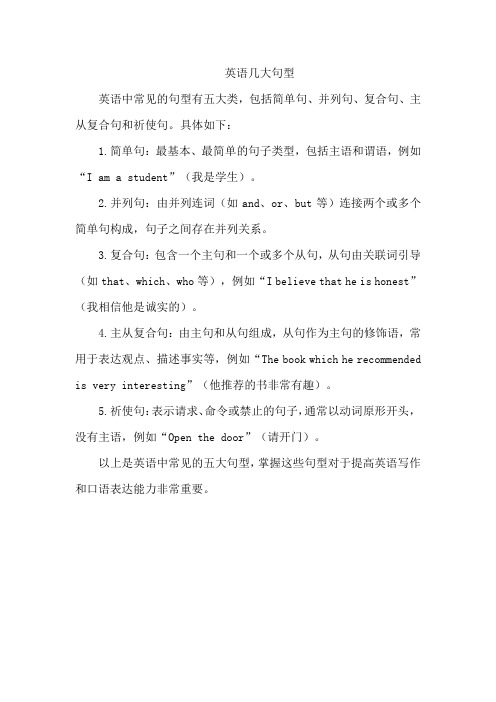
英语几大句型
英语中常见的句型有五大类,包括简单句、并列句、复合句、主从复合句和祈使句。
具体如下:
1.简单句:最基本、最简单的句子类型,包括主语和谓语,例如“I am a student”(我是学生)。
2.并列句:由并列连词(如and、or、but等)连接两个或多个简单句构成,句子之间存在并列关系。
3.复合句:包含一个主句和一个或多个从句,从句由关联词引导(如that、which、who等),例如“I believe that he is honest”(我相信他是诚实的)。
4.主从复合句:由主句和从句组成,从句作为主句的修饰语,常用于表达观点、描述事实等,例如“The book which he recommended is very interesting”(他推荐的书非常有趣)。
5.祈使句:表示请求、命令或禁止的句子,通常以动词原形开头,没有主语,例如“Open the door”(请开门)。
以上是英语中常见的五大句型,掌握这些句型对于提高英语写作和口语表达能力非常重要。
(完整版)简单句、并列句、复合句、并列复合句
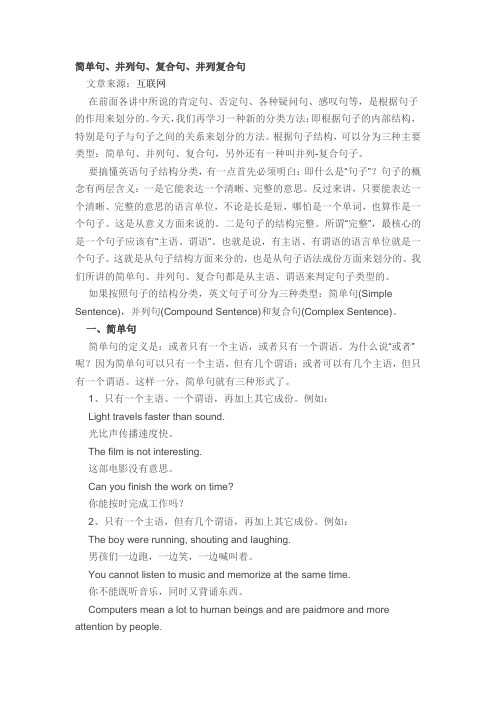
简单句、并列句、复合句、并列复合句文章来源:互联网在前面各讲中所说的肯定句、否定句、各种疑问句、感叹句等,是根据句子的作用来划分的。
今天,我们再学习一种新的分类方法:即根据句子的内部结构,特别是句子与句子之间的关系来划分的方法。
根据句子结构,可以分为三种主要类型:简单句、并列句、复合句,另外还有一种叫并列-复合句子。
要搞懂英语句子结构分类,有一点首先必须明白:即什么是“句子”?句子的概念有两层含义:一是它能表达一个清晰、完整的意思。
反过来讲,只要能表达一个清晰、完整的意思的语言单位,不论是长是短,哪怕是一个单词,也算作是一个句子。
这是从意义方面来说的。
二是句子的结构完整。
所谓“完整”,最核心的是一个句子应该有“主语、谓语”。
也就是说,有主语、有谓语的语言单位就是一个句子。
这就是从句子结构方面来分的,也是从句子语法成份方面来划分的。
我们所讲的简单句、并列句、复合句都是从主语、谓语来判定句子类型的。
如果按照句子的结构分类,英文句子可分为三种类型:简单句(Simple Sentence),并列句(Compound Sentence)和复合句(Complex Sentence)。
一、简单句简单句的定义是:或者只有一个主语,或者只有一个谓语。
为什么说“或者”呢?因为简单句可以只有一个主语,但有几个谓语;或者可以有几个主语,但只有一个谓语。
这样一分,简单句就有三种形式了。
1、只有一个主语、一个谓语,再加上其它成份。
例如:Light travels faster than sound.光比声传播速度快。
The film is not interesting.这部电影没有意思。
Can you finish the work on time?你能按时完成工作吗?2、只有一个主语,但有几个谓语,再加上其它成份。
例如:The boy were running, shouting and laughing.男孩们一边跑,一边笑,一边喊叫着。
- 1、下载文档前请自行甄别文档内容的完整性,平台不提供额外的编辑、内容补充、找答案等附加服务。
- 2、"仅部分预览"的文档,不可在线预览部分如存在完整性等问题,可反馈申请退款(可完整预览的文档不适用该条件!)。
- 3、如文档侵犯您的权益,请联系客服反馈,我们会尽快为您处理(人工客服工作时间:9:00-18:30)。
二、简单句、并列句和复合句(一)句子种类两种分类法1、按句子的用途可分四种:1)陈述句(肯定、否定):He is six years old; She didn't hear of you before.2)疑问句(一般、特殊、选择、反意):Do they like skating? How old is he? Is he six or seven years old? Mary can swim, can't she?3)祈使句:Be careful, boys; Don't talk in class4)感叹句:How clever the boy is!2、按句子的结构可分三种:1)简单句:只有一个主语(或并列主语)和一个谓语(或并列谓语)。
e.g. He often reads English in the morning.Tom and Mike are American boys.She likes drawing and often draws pictures for the wall newspapers.2) 并列句:由并列连词(and, but, or等)或分号(;)把两个或两个以上的简单句连在一起构成。
e.g. You help him and he helps you.The future is bright; the road is tortuous. 前途是光明的,道路是曲折的。
3)复合句:含有一个或一个以上从句的句子。
复合句包含:名词性从句(主语从句、宾语从句、表语从句和同位语从句)、定语从句和状语从句等。
e.g. The foreign visitors took a lot of pictures when they were at the Great Wall.(二)简单句的五种基本句型1、主语+系动词+表语:e.g. He is a student.2、主语+不及物动词:e.g. We work.3、主语+及物动词+宾语:e.g. Henry bought a dictionary.4、主语+及物动词+双宾语(间接宾语+直接宾语):e.g. My father bought me a car.5、主语+及物动词+复合宾语(宾语+宾补):e.g. Tom made the baby laugh.注:其他各种句子都可由这一种基本句型扩展、变化或省略而构成。
(三)并列句的分类1、表示连接两个同等概念,常用and, not only…but also…, neither…nor…, then等连接。
e.g. The teacher's name is Smith, and the student's name is John.2、表示选择,常用的连词有or, either…or…, otherwise等。
e.g. Hurry up, or you'll miss the train.3、表示转折,常用的连词有but, still, however, yet, while, when等。
e.g. He was a little man with thick glasses, but he had a strange way of making his classes lively and interesting.4、表示因果关系,常用的连词有so, for, therefore等。
e.g. August is the time of the year for rive harvest, so every day I work from dawn until dark.(四)高考考点探讨1、简单句的五大句型是最基本的句型。
虽然近几年单纯考查这种基础句型的题不多,但是在阅读中有时需借助于划分句子成分去理解,在书面表达中,没有最基本的遣词造句的能力是不可能用地道的英语句子来表达清楚的。
2、祈使句、反意疑问句和感叹句是高考命题的热点之一。
有时把祈使句与反意疑问句结合于一体来考查。
一个题目,几个考点,是近几年命题的发展趋势。
3、高考对简单句、并列句和各种复合句的考查常表现在对连词的选择和使用上。
如:and, but, or, while,以及其它连接名词性从句、定语从句和状语从句的连接词、关联词。
4、各种主从复合句的考查常常与动词的时态联系在一起,以宾语从句与状语从句最为明显,时间从句与条件从句中,如果主句是将来时,从句则用一般式表将来,这一点在高考中经常考查。
如:We will go outing if it doesn't rain tomorrow。
练习二、简单句、并列句和复合句一、判断下列句子是简单句、并列句还是复合句:1. We often study Chinese history on Friday afternoon.2. The boy who offered me his seat is called Tom.3. There is a chair in this room, isn't there?4. My brother and I go to school at half past seven in the morning and come back home at seven in the evening.5. He is in Class One and I am in Class Two.6. He was fond of drawing when he was yet a child.7. Neither has he changed his mind, nor will he do so.8. What he said at the meeting is very important, isn't it?9. The farmer is showing the boy how to plant a tree.10. Both Tom and Jack enjoy country music.二、判断下列短文中各句是简单句、并列句还是复合句:I hope you are very well( ). I'm fine, but tired( ). Right now it is the summer vacation and I'm helping my Dad on the farm( ). August is the hottest month here( ). It is the time of year for the rice harvest, so every day I work from dawn until dark.( ) Sometimes we go on working after dark by the lights of our tractors( ). We grow rice in the south of the States, but in the north where it is colder they grow wheat( ). We have a lot of machines on the farm( ). Although the farm is large, my Dad has only two men working for him( ). But he employs more men for the harvest( ). Mybrother takes care of the vegetable garden( ). It doesn't often rain in the summer here( ). As a result, we have to water the vegetable garden( ). Every evening we pump water from a well( ). It then runs along channels to different parts of the garden( ).Most Saturday evenings there is a party, even at harvest time( ). These parties often make us very happy( ). We cook meat on an open fire outside( ). It's great( )! Americans eat a lot of meat - too much in my opinion( ). Some of my friends drink beer( ). I don't, because I have to drive home after the party( ). In your letter you asked about the time in different areas of the States( ). There are five different time areas in the States( ). In my state we are fourteen hours behind Beijing time( ). How many different time areas do you have in China( )? Well, I must stop and get some sleep( ). Please give my best regards to your parents( ).三、选择填空:1. Give me one more minute ____ I'll be able to finish it.A. andB. orC. ifD. so2. It's the third time that John has been late, ____?A. hasn't heB. isn't heC. isn't itD. hasn't it3. ____ joyful he was to meet his brother again!A. HowB. WhatC. What aD. What an4. Let us pass, ____?A. shan't weB. shall weC. won't weD. will you5. I suppose he's serious, ____ ?A. do IB. don't IC. is heD. isn't he6. You had better not smoke here, ____?A. will youB. had youC. shall youD. have you7. Train as hard as you can ____ you'll win the swimming competition.A. thenB. butC. andD. or8. I'm sorry to have to say this, ____ you forgot to turn off the lights when you left the room last night.A. andB. butC. soD. because9. John has not yet passed the driving test, and ____.A. Henry hasn't tooB. Henry also has not eitherC. neither Henry hasD. neither has Henry10. There are many sports lovers in his office. Some love climbing, ____ others enjoy swimming.A. orB. forC. whileD. so11. ---- Do you feel like going out ____ would you rather have dinner at home?---- I'd like to go out. A. or B. and C. but D. so12. ---- "____ is the temperature today?" ----"It's 38 degrees."A. WhichB. HowC. How hotD. How high13. ---- Your uncle isn't an engineer, is he? ---- ____.A. Yes, he isn'tB. No, he isn'tC. No, he isD. He is14. ____ friendly ____ to everyone!A. How, is sheB. What, is sheC. How, she isD. What, she is15. Mary went to bed early, ____ she felt very tired.A. orB. soC. forD. yet16. Mother ____ a dress when she cut her finger.A. was makingB. makesC. is makingD. made17. He lay in bed ____ read something borrowed from library.A. butB. andC. orD. yet18. ---- I'd really like some lunch but I have so much work to do.---- ____ what you want and I can get it for you.A. Tell meB. If you would say to meC. You will tell meD. If you tell me19. As he is strong, ____ can lift one hundred pounds.A. yet heB. but heC. andD. he20. ---- I thought you had an umbrella. ---- I had, ____ I've lost it.A. sinceB. butC. becauseD. so21. ____ down the radio ---- the baby's asleep in the next room.A. TurningB. To turnC. TurnedD. Turn22. ---- I don't like chicken ____ fish. ---- I don't like chicken ____ I like fish very much.A. and, andB. and, butC. or, andD. or, but23. ---- Would you like to come to dinner tonight? ---- I'd like to, ____ I'm too busy.A. andB. soC. asD. but24. Would you like a cup of coffee ____ shall we get down to business right away?A. andB. thenC. orD. otherwise25. She set out soon after dark ____ home an hour later.A. arrivingB. to arriveC. having arrivedD. and arrived26. "Can't you read?" Mary said ____ to the notice.A. angrily pointingB. and point angrilyC. angrily pointedD. and angrily pointed27. She thought I was talking about her daughter, ____, in fact, I was talking about my daughter.A. whomB. whereC. whichD. while28. ____ it with me and I'll see what I can do.A. When leftB. LeavingC. If you leaveD. Leave29. ---- Alice, you feed the bird today, ____? ---- But I fed it yesterday.A. do youB. will youC. didn't youD. don't you30. ____ him and then try to copy what he does.A. MindB. Glance atC. Stare atD. Watch四、按要求完成下列句子:1. He dares to tell the truth.(改为否定句)2. They have lived here for more than ten years.(对画线部分提问)3. There will be a sports meet at the end of this month, ____________?(完成反意疑问)4. You must be careful with your pronunciation.(改为祈使句)5. They went for a walk after supper yesterday evening.(改为一般疑问句)6. It is an interesting story.(改为感叹句)7. This magazine comes out(出版)every other week.(对画线部分提问)8. They could hardly believe his words, ____________?(完成反意疑问)9. The moon is shining brightly.(改为感叹句)10.Our English teacher is always encouraging us to speak English in class. (对画线部分提问)答案:练习一:一、1、主语,定语;2、间接宾语;3、谓语,状语;4、定语;5、状语,状语;6、定语,表语;7、宾语,状语;8、谓语,主语;9、谓语;10、主语,表语;11、谓语,宾语;12、状语;13、形式宾语,真正宾语;14、宾语、定语;15、插入语,状语;16、宾语(间宾+直宾);17、状语,状语;18、形式主语,表语,宾补;19、宾补;20、表语二、略三、略四、1~5 CBDBB 6~10 ACBAB练习二:一、1、简单句;2、复合句;3、简单句;4、简单句;5、并列句;6、复合句;7、并列句;8、复合句;9、简单句;10、简单句二、I hope you are very well(复合句). I'm fine, but tired(简单句). Right now it is the summer vacation and I'm helping my Dad on the farm(并列句). August is the hottest month here(简单句). It is the time of year for the rice harvest, so every day I work from dawn until dark.(并列句) Sometimes we go on working after dark by the lights of our tractors(简单句). We grow rice in the south of the States, but in the north where it is colder they grow wheat(并列复合句). We have a lot of machines on the farm(简单句). Although the farm is large, my Dad has only two men working for him(复合句). But he employs more men for the harvest(简单句). My brother takes care of the vegetable garden(简单句). It doesn't often rain in the summer here(简单句). As a result, we have to water the vegetable garden(简单句). Every evening we pump water from a well(简单句). It then runs along channels to different parts of the garden(简单句).Most Saturday evenings there is a party, even at harvest time(简单句). These parties often make us very happy(简单句). We cook meat on an open fire outside(简单句). It's great( 简单句)! Americans eat a lot of meat - too much in my opinion(简单句). Some of my friends drink beer(简单句). I don't, because I have to drive home after the party(复合句). In your letter you asked about the time in different areas of the States(简单句). There are five different time areas in the States(简单句). In my state we are fourteen hours behind Beijing time(简单句). How many different time areas do you have in China(简单句)? Well, I must stop and get some sleep(简单句). Please give my best regards to your parents(简单句).三、1~5 ACADD 6~10 BCBDC 11~15 ADBCC 16~20 ABADB 21~25 DDDCD 26~30 ADDBD四、1. He doesn't dare to tell the truth. 或He dare not tell the truth. 2. How long have they lived here? 3. won't there 4. Be careful with your pronunciation. 5. Did they go for a walk after supper yesterday evening? 6. What an interesting story (it is)! 或How interesting the story is! 7. How often does this magazine come out? 8. could they 9. How brightly the moon is shining! 10. Who is always encouraging us to speak English in class?。
